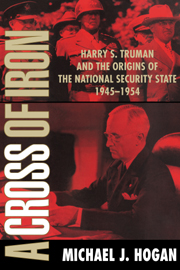Book contents
- Frontmatter
- Contents
- Preface and Acknowledgments
- 1 The National Security Discourse: Ideology, Political Culture, and State Making
- 2 Magna Charta: The National Security Act and the Specter of the Garrison State
- 3 The High Price of Peace: Guns-and-Butter Politics in the Early Cold War
- 4 The Time Tax: American Political Culture and the UMT Debate
- 5 “Chaos and Conflict and Carnage Confounded”: Budget Battles and Defense Reorganization
- 6 Preparing for Permanent War: Economy, Science, and Secrecy in the National Security State
- 7 Turning Point: NSC-68, the Korean War, and the National Security Response
- 8 Semiwar: The Korean War and Rearmament
- 9 The Iron Cross: Solvency, Security, and the Eisenhower Transition
- 10 Other Voices: The Public Sphere and the National Security Mentality
- 11 Conclusion
- Selected Bibliography
- Index
6 - Preparing for Permanent War: Economy, Science, and Secrecy in the National Security State
Published online by Cambridge University Press: 03 May 2010
- Frontmatter
- Contents
- Preface and Acknowledgments
- 1 The National Security Discourse: Ideology, Political Culture, and State Making
- 2 Magna Charta: The National Security Act and the Specter of the Garrison State
- 3 The High Price of Peace: Guns-and-Butter Politics in the Early Cold War
- 4 The Time Tax: American Political Culture and the UMT Debate
- 5 “Chaos and Conflict and Carnage Confounded”: Budget Battles and Defense Reorganization
- 6 Preparing for Permanent War: Economy, Science, and Secrecy in the National Security State
- 7 Turning Point: NSC-68, the Korean War, and the National Security Response
- 8 Semiwar: The Korean War and Rearmament
- 9 The Iron Cross: Solvency, Security, and the Eisenhower Transition
- 10 Other Voices: The Public Sphere and the National Security Mentality
- 11 Conclusion
- Selected Bibliography
- Index
Summary
In the ideology of national security, the distinction between war and peace had disappeared in a new era of permanent preparedness that embraced every segment of the nation's society and economy. Needed were plans to harness essential assets to the nation's security and government agencies with enough authority to implement these plans, including plans for the mobilization of science and scientific manpower. Not only that; government had to safeguard economic and scientific secrets by regulating the exchange of information, ensuring the loyalty of federal employees, and guarding against the dangers of internal subversion. In all these areas the national security discourse was essentially a discourse in state making, and the challenge, as in building a new military establishment, was to remake existing institutions or create new ones without wrecking the democratic foundations on which they were erected.
This was a difficult task, in part because national security planners had to take account of established interests, older values, and cherished traditions. Indeed, their quest for authority often challenged the prerogatives of more traditional agencies and groups, not to mention free–market principles and normal government procedures, with results that led to bitter quarrels over how power should be divided, distributed, and held accountable. Economic mobilizers envisioned an operating as well as a planning agency with enough power to override the rights and interests of established authorities. Leading scientists sought a partnership with government on terms that shielded their work from congressional oversight and presidential control.
- Type
- Chapter
- Information
- A Cross of IronHarry S. Truman and the Origins of the National Security State, 1945–1954, pp. 209 - 264Publisher: Cambridge University PressPrint publication year: 1998



